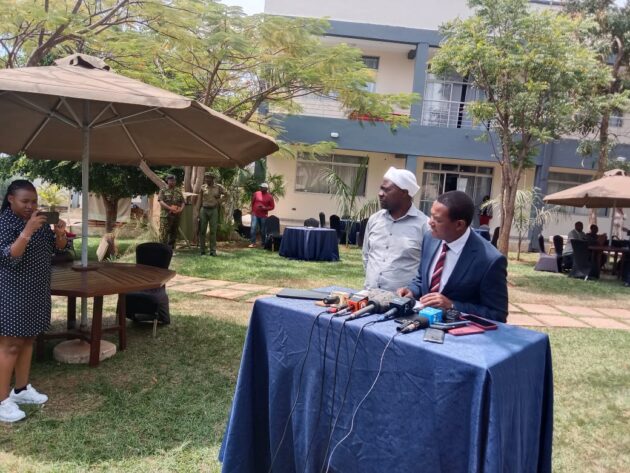The government is mulling changes to the rate of Value Added Tax (VAT) in the next financial year’s revenue-raising plan.
National Assembly Finance Committee chairman Kuria Kimani said Tuesday that there was an ongoing conversation about reducing the rate or keeping it at the current level.
There is also pressure from the East African Community member states for a uniform rate of 18 per cent.
The Molo MP in an exclusive interview with the Star left no doubt that the VAT rate may go down in efforts for Kenyans to have more disposable income.
“There is a conversation about VAT. We are asking; should we retain it at 16 per cent, what would be the effect if we increase and what would be the effect if we reduce?”
A reduction of VAT is likely to lead to a drop in prices of goods, including basic commodities such as sugar and cooking oil.
“Perhaps if we reduced VAT, we could then incentivise the market so that we can collect more. That is one of the conversations we are trying to have,” Kimani said.
The MP, who is among the architects of the tax law, also hinted that the government may not deviate a lot from the tax measures in the current law.
Kimani said the minimal changes, expected in the Finance Bill, 2024, would be to ensure a stable economic and taxation environment for investors.
“How do we also make sure that our tax regime is predicable? If we gave tax incentives for investors last year, how do we make sure that we don’t change our environment so much,” he said.
The MP said the idea is that if some incentives were given only last year, there would be no point in rolling back the gains.
“Why would we again change them [tax incentives] and yet someone had already invested?” Kimani said.
The overall aim, he pointed out, is to achieve an optimum tax rate – that is one which doesn’t press Kenyans, and also ensures maximum revenues.
“In the next few days, I will be tabling the Finance Bill, 2024, and we will give Kenyans a chance to air their views I am sure we will find a level-playing ground for ensuring we have an optimal tax rate that not only generates us good revenue but also doesn’t affect the disposable income of Kenyans, leading to non-performance of other tax heads,” the MP said.
Since 2003, Kenyans have paid 16 per cent VAT on goods and services.
Before then it was charged at 18 per cent, and the reduction was to spur economic growth after President Mwai Kibaki’s administration took over.
The National Treasury had earlier hinted that the VAT rate would come down in the medium term.
A strategy paper by Treasury CS Njuguna Ndung’u revealed that Kenya Kwanza was considering reducing corporate tax to 25 per cent.
It also indicated that the government would review excise duty on petroleum products.
“The strategies for boosting revenue collection focus on all the tax heads, income tax, VAT, excise duty and customs duty,” Treasury says in the 2024 Budget Policy Statement.
In the plan, Kenya Kwanza sought to “gradually phase out preferential corporate tax rates and introduce the minimum tax.”
The government had also indicated that it may introduce a withholding tax on goods supplied to the government.
Only consultancies and other expatriate works offered to ministries, state departments and agencies attract a withholding tax.
President Ruto’s tax measures in the Finance Act, of 2023, triggered protests by opposition players, sections of the clergy, and Kenyans – who expressed their dissatisfaction on various social platforms.
On its enactment, Opposition chief Raila Odinga staged protests, citing punitive measures in the new administration’s tax regime.
The law staged an increase in fuel tax to 16 per cent, set in place an affordable housing levy, imposed a turnover tax, and realigned zero-rated products, and various levies to cut down on imports.
But Kimani said the Finance Act, 2023, was among the tools that have steered the country through the economic situation.
“One of the things that the Finance Act of 2023 has done is make us conscious of our tax obligations. We have a national conversation about taxation,” the Molo MP said.
He said going into the 2024 -25 fiscal year plan, the aim to ensure the country achieves the optimal tax rate.
“We are working towards a situation where we are not taxing too much in a way that it crowds out investment and reduces disposable income so much that the taxpayer’s ability to spend is reduced.”
The Finance Committee chairman dismissed claims of taxes targeting farmers saying the narrative was driven by propagandists.
“There is no tax that was raised on farmers…no avocado tax or any of that sort…that is a propaganda that has been peddled to a point the propagators want to make it believable. I know the Finance Act like the back of my hand. There has not been introduction of new taxes targeting farmers,” Kimani said.
The lawmaker pointed out measures such as the introduction of excise duty on imported furniture and clinker as having boosted the economy.
He said since the country is not out of the woods yet, more unpopular decisions may follow.”
“We are still where for every Sh10 we collect, Sh7 goes to debt repayment and the rest is shared among MDAs for operations, salaries, and development,” the Finance Committee chair said.
“Some of the suggestions have been to increase taxes but we are now considering the negative effects. Even still, we have to also look at the negative effect of debt.”











